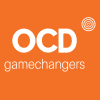Now that you have received a clinical diagnosis of Obsessive Compulsive Disorder, what comes next? The most important step you can take is finding a licensed therapist who utilizes Exposure and Response Prevention (ERP) therapy. This is truly the gold standard in treating OCD and related disorders, and research shows that it is typically the biggest factor in OCD recovery.
In addition to working with an OCD specialist, it can be beneficial to find a community of others who also have OCD and/or anxiety. As with other mental disorders, OCD can feel very isolating; understanding that there is an entire world of other individuals with similar experiences can help us feel validated in what we’re going through. The International OCD Foundation (IOCDF) has a list of their support groups here: https://iocdf.org/ocd-finding-help/supportgroups/ and NOCD (an online therapy service for those with OCD and related disorders) also has a list of free support groups here: https://www.treatmyocd.com/support-groups
Journaling can be another helping way to cope when the intrusive thoughts and obsessions that come with OCD feel too overwhelming. Writing down how we feel can often assist in getting those difficult emotions out of our brain and onto paper; some call it a “brain dump” or “free write” to put pen to paper. It might be helpful to jot down some things and then rip up and throw away the paper in an attempt to physically move through what we’re experiencing.
Rewarding ourselves with something (a yummy treat, an article of clothing, or a new book, for example) when we complete a really challenging exposure can be a simple way to aid in our recovery. Having something to look forward to after working on something extremely difficult can make the experience a bit easier on ourselves. Moving our bodies in a healthy way can help throughout our recovery journey, as well. Getting our heart-rate up and our adrenaline going can help us get “out of our head” in a way, and it can be a helpful resource.
Self-compassion is a key factor in our recovery! The thoughts that we have with OCD are unwelcome and can feel extremely distressing, so allowing those to simply exist without assigning meaning to them – while simultaneously recognizing that our thoughts are something we have but they are not who we are – is imperative. Being able to have compassion for ourselves will make our recovery journey more manageable.
It is important to note, however, that any action we take can become compulsive, if we are not careful. It might be helpful to take a deeper look into why we are performing the action — if it is to lower our anxiety and make us feel better right away, that may be a compulsion. However, if we are taking action in a more mindful way to aid in our overall recovery, that is probably a healthy coping mechanism that can work alongside therapy.
Mollie Albanese
Author

